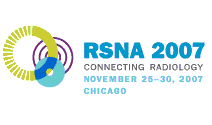
Abstract Archives of the RSNA, 2007
Shuang Xia MD, Presenter: Nothing to Disclose
Ji Qi MD, PhD, Abstract Co-Author: Nothing to Disclose
To elucidate the regions of cerebral dysfunction correlated with such neuropsychologic deficits after traumatic brain injury using DWI and MRS.
20 patients with closed brain injury were performed MR scan within one week. DWI sequence(b=1000 s /mm2 )and single-voxel spectroscopy (TE=35ms) were scanned . 1H-MRS was performed in the parietal white matter and stem regions in brain in which no definite abnormalities in MR imaging were found at the time of examination. The functional status for all patients with the GCS evaluation were compared on the same day with 1H-MRS and DWI results.
Three kinds of signal characteristica were detected on DWI and apparent diffusion coefficient (ADC) maps: type 1, DWI- and ADC-hyperintense most likely representing lesions with vasogenic edema; type 2, DWI-hyperintense, ADC-hypointense indicating cytotoxic edema; type 3, central hemorrhagic lesion surrounded by an area of increased diffusion. Type1 and type 2 lesions (12 patients)correlated with well prognosis(high GCS score) and type 3 with bad prognosis(8 patients). N-acetyl aspartate/creatine ratios were significantly lower, the choline/creatine, myo-inositol/creatine , Glx / Cho ratios were significantly higher and both of them had significant correlations with GCS scores (p < 0.05).
DWI can show different degrees and extent of tissue injury. MRS can early evaluate the excitotoxic injury and membrane disruption which correlate with neurologic disability.
All of the trauma patients were performed DWI and MRS TO PREDICT THE OUTCOME.
Xia, S,
Qi, J,
The Usefulness of Combined DWI and MRS in Patients with Neuropsychologic Deficits after Diffuse Axonal Injury. Radiological Society of North America 2007 Scientific Assembly and Annual Meeting, November 25 - November 30, 2007 ,Chicago IL.
http://archive.rsna.org/2007/5001920.html

